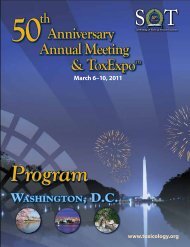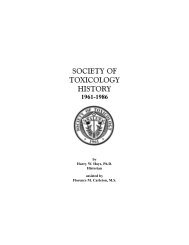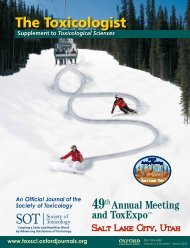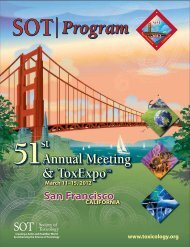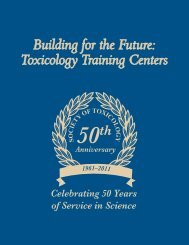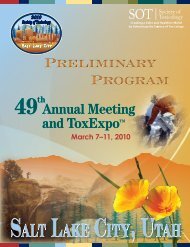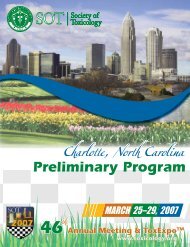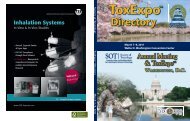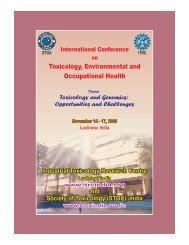51st Annual Meeting & ToxExpo - Society of Toxicology
51st Annual Meeting & ToxExpo - Society of Toxicology
51st Annual Meeting & ToxExpo - Society of Toxicology
You also want an ePaper? Increase the reach of your titles
YUMPU automatically turns print PDFs into web optimized ePapers that Google loves.
San Francisco, California<br />
The Thematic Track information can be found on pages 8–9.<br />
in these disease areas have been identified. While pharmaceutical<br />
inhibitors <strong>of</strong> epigenetic targets such as histone deacetylases and DNA<br />
methyltransferases have recently gained regulatory approval, the field<br />
<strong>of</strong> pharmacoepigenetics is still relatively young. As greater understanding<br />
<strong>of</strong> the epigenome is evolving, previously approved drugs<br />
are now serendipitously being found to have epigenetic modulatory<br />
properties and are currently under evaluation for new indications.<br />
With the rapid emergence <strong>of</strong> multiple novel epigenetic targets for<br />
pharmacological inhibition, new considerations for the field <strong>of</strong> toxicoepigenetics<br />
are becoming apparent as well. In order to address the<br />
potential toxicological consequences associated with pharmacological<br />
inhibition <strong>of</strong> potential therapeutic epigenetic targets, toxicologists are<br />
addressing the need for new models and endpoints to be considered<br />
in the safety assessment <strong>of</strong> epigenetic targets. These important toxicological<br />
issues, which may be unique to epigenetic targets, will be<br />
addressed.<br />
• Epigenetics Meets <strong>Toxicology</strong>: An Integrated View <strong>of</strong><br />
Mechanisms Controlling Transcription That Are Superimposed<br />
on DNA Base Sequence. Jay Goodman, Michigan State University,<br />
East Lansing, MI.<br />
• Evaluation <strong>of</strong> Potential Safety Risks <strong>of</strong> Pharmacological<br />
Inhibitors <strong>of</strong> Epigenetic Targets in Discovery <strong>Toxicology</strong>.<br />
Brandon Jeffy, Celgene, San Diego, CA.<br />
• Epigenomics—Impact for Drug Safety Sciences. Jonathan Moggs,<br />
Novartis, Basel, Switzerland.<br />
• Investigation <strong>of</strong> Transgenerational Epigenetic Inheritance in<br />
Product Safety Assessment. Reza Rasoulpour, The Dow Chemical<br />
Company, Midland, MI.<br />
• Current and Future Epigenetic Therapies. Nessa Carey, Pfizer,<br />
Cambridge, United Kingdom.<br />
Regulatory Science: Bridging the<br />
Gap between Discovery and Product<br />
Availability<br />
21st Century Validation Strategies—One Size No<br />
Longer Fits All<br />
Symposia<br />
drugs are tested for their risk to humans. This new vision <strong>of</strong> toxicology<br />
testing will be based upon human rather than animal biology and<br />
will involve a strong commitment to the 3Rs—replacement, reduction,<br />
and refinement <strong>of</strong> animal use in research and testing. There are<br />
many challenges to fully implementing this vision. Current formal<br />
approaches to validation involve lengthy and expensive processes that<br />
require validating in vitro data against in vivo data. This approach may<br />
not be relevant or even feasible for the new pathways and endpoints<br />
being measured. Consequently, applying a one size fits all approach<br />
to validation is not conducive to the rapid incorporation <strong>of</strong> emerging<br />
science or technology into the regulatory decision-making framework.<br />
As new safety testing evolves, new approaches to demonstrating<br />
that a test is reliable and relevant for a particular purpose must also<br />
evolve. Such approaches may differ for different tests and be based<br />
on their intended use (e.g., as part <strong>of</strong> screening or other algorithmic<br />
approaches versus intended replacement <strong>of</strong> existing tests). To meet<br />
this challenge will require an active dialogue and early collaboration<br />
among all stakeholders, including federal regulatory agencies, other<br />
regulators, NGOs, academia, and industry scientists. This session<br />
<strong>of</strong>fers an opportunity for such a dialogue about what could constitute<br />
a more flexible approach to demonstrating that these new toxicology<br />
testing methods are scientifically valid and address the fundamental<br />
questions <strong>of</strong> human safety and efficacy.<br />
• Challenges to Incorporating New Technologies into the<br />
<strong>Toxicology</strong> Regulatory Testing Paradigm. Wallace Hayes, Harvard<br />
University, Andover, MA.<br />
• Biomarker Qualification—A Pathway for Acceptance <strong>of</strong><br />
Alternative <strong>Toxicology</strong> Test Methods by Regulatory Agencies.<br />
Marc Walton, US FDA, Silver Spring, MD.<br />
• Developing Scientific Confidence in Computational Approaches<br />
for Hazard Evaluation. Richard A. Becker, American Chemical<br />
Council, Washington, DC.<br />
• Toxicity Test Validation in the 21st Century. Vicki Dellarco,<br />
US EPA, Washington, DC.<br />
• In Vitro/In Silico/Exploratory Assessment <strong>of</strong> Pharmaceuticals.<br />
Abigail Jacobs, US FDA, Silver Spring, MD.<br />
• An Evolving Example <strong>of</strong> Integrating In Vitro Risk Signals.<br />
Robert Chapin, Pfizer, Inc., Groton, CT.<br />
Scientific<br />
Monday, March 12, 2:00 PM to 4:45 PM<br />
Chairperson(s): Suzanne C. Fitzpatrick, US FDA, Silver Spring, MD,<br />
and Richard A. Becker, American Chemical Council, Washington, DC.<br />
Sponsor:<br />
In Vitro and Alternative Methods Specialty Section<br />
Endorsed by:<br />
Regulatory Safety Evaluation Specialty Section<br />
Risk Assessment Specialty Section<br />
Recent advances in systems biology and related scientific fields <strong>of</strong>fer<br />
the potential to fundamentally change the way that chemicals and<br />
up-to-date information at www.toxicology.org 71<br />
Thematic Session



